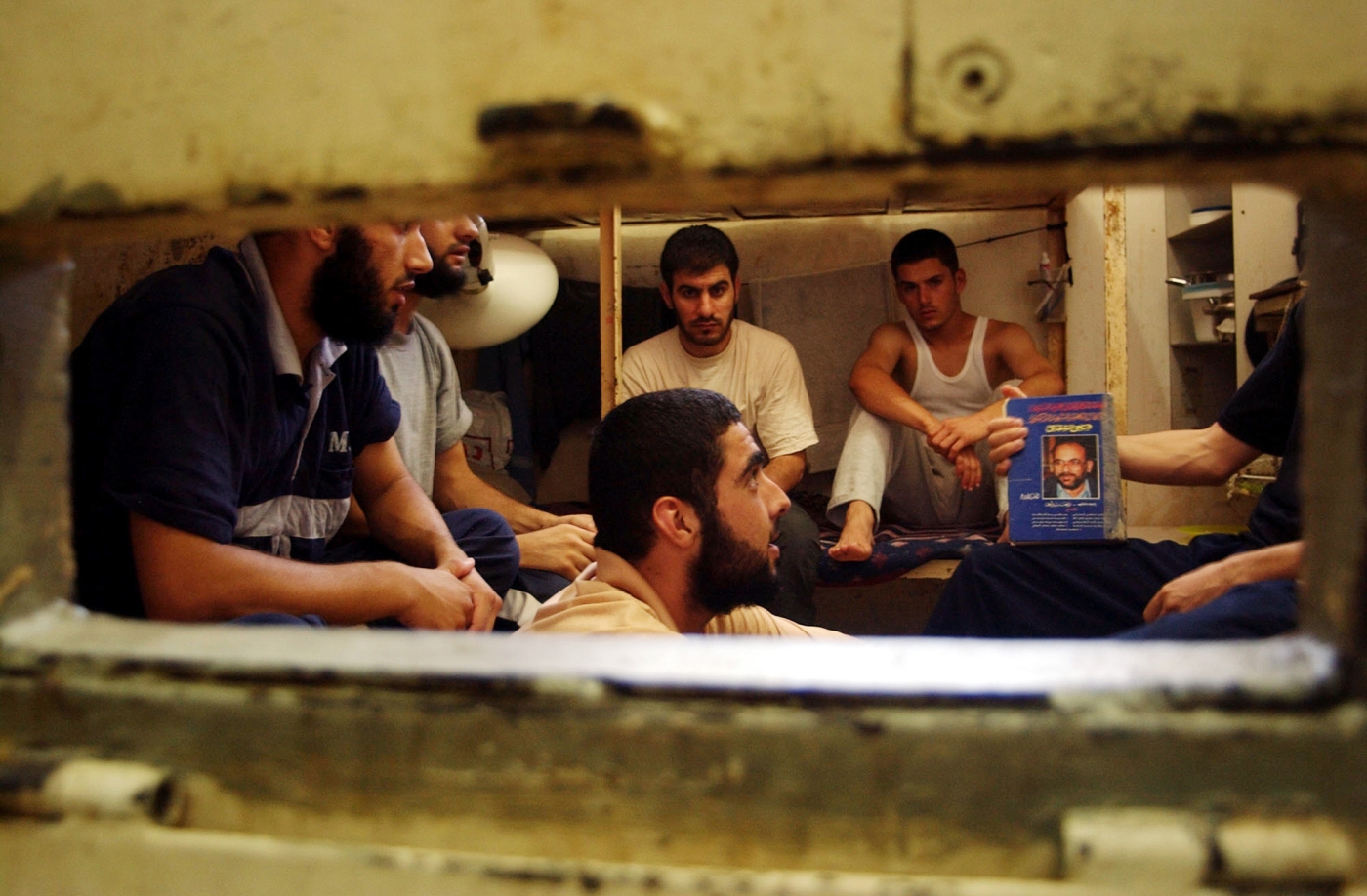Palestinian prisoners protest against Israel's ill-treatment of minors and women
Palestinians in Ofer, Naqab, Gilboa and Nafha prisons are railing against the conditions faced in north Israel's Damon

Palestinian prisoners sit in a prison cell in Ashkelon in 2004 (Reuters)
Palestinian prisoners in Israel refused to take their meals and locked down sections of their prisons on Monday, in protest against the ill-treatment and bad conditions minors and women are suffering at Damon prison.
In a statement, Palestinian prisoners said that they would not “ignore what the occupation prison service is doing to our women and youth".
The action took place between 1-3pm, ahead of talks with the Israel Prison Service (IPS). Palestinians protested in Ofer, Naqab, Gilboa and Nafha prisons, according to Wafa news agency.
According to the prisoners, minors and women in north Israel's Damon prison are not being provided with adequate food and drink, and lack the blankets and warm clothing needed in winter months.
In Ofer, a prison in the occupied West Bank, the IPS deployed extra security forces and cancelled family visits after a prisoner allegedly stabbed a jailer in the neck early on Monday.
In December, Israeli prisons held about 5,000 Palestinians, including 41 women and 185 minors - 24 of which were under 16 years old, according to Palestinian prisoners' advocacy group Addameer.
'Collective punishment'
Siham Abdel Jaber, a mother of one boy imprisoned in Damon, said she had heard no news of her 17-year-old son Mohammed for weeks after he was moved to the prison along with 60 other minors on 11 January. Finally she managed to see him during a court appearance last week, she said.
“We have been notified along with other families that we are banned from visiting for four months, as a collective punishment on prisoners,” Abdel Jaber said.
Mohammed was arrested on 26 March 2019 and faces seven charges. He is accused of throwing stones and Molotov cocktails at Israeli forces.
The teen suffers from a heart valve inflammation, requiring medical care and a monthly injected treatment, and Abdel Jaber is anxious that he may not be receiving these.
“He looked tired and exhausted at the court last week, and Israeli soldiers prevented him from uttering a word to me," Abdel Jaber said, adding that she had seen bruises on his face, neck and body in August. "I asked him if he had been abused, and he nodded his head."
Adel Zahran, whose 17-year-old son Ammar is also held in Damon, called on international and Palestinian bodies to form an investigative committee to visit the prison and check on the conditions of its inmates.
Zahran, from Deir Abu Mishal, north of the West Bank city of Ramallah, told MEE that he lies awake at night worrying about his son.
“I do not sleep while thinking about him. We have had no news from Ammar since January and we were banned from visiting him," Zahran said.
"Isolating children from the older prisoners is aimed at pressuring them and preventing them from having a national-political education and reasoning,” he added.
The family of Moaid al-Anati, a 14-year-old from al-Fawwar refugee camp south of Hebron, told MEE that their son suffered beatings the day he arrived at Damon prison in January.
'Isolating children from the older prisoners is aimed at pressuring them and preventing them from having a national-political education and reasoning'- Adel Zahran, prisoner's father
Mahmoud al-Anati, his father, told MEE: “We live 24 hours a day in fear and we don’t sleep at night… His mother did not feel well after news of him stopped.”
He said that they visited Moaid twice a month while he was in Ofer prison, and were reassured that there were older prisoners who took care of him.
Moaid has been imprisoned for five months. He faces an 11-month sentence after being accused of throwing stones at Israeli settlers in the Old City of Hebron.
“Moaid was affected after his cousin was killed by Israel. This was in 2014, and [his cousin] Khalil al-Anati was his best friend. Moaid had therapy every week to talk about that,” his father said.
MEE has asked the IPS to comment on the allegations 0f abuse, but received no response by the time of publication.


